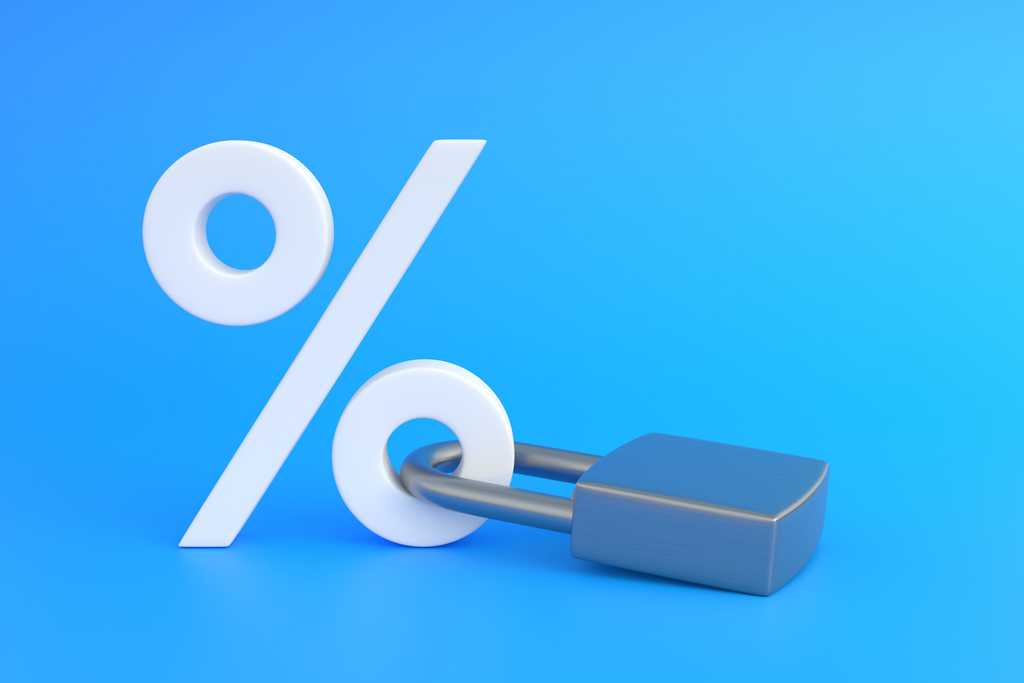There are many factors that impact how much you pay for your home loan, and your mortgage interest rate is one of the most important. After all, your mortgage rate will determine how much your monthly mortgage payment amounts to, as well as how much interest you pay on your mortgage for the life of the loan.
That said, mortgage rates tend to go up and down quite a bit, not only from day to day but from hour to hour. To get the best mortgage rate you possibly can, you'll want to strike while the iron is hot.
A mortgage rate lock can help you do exactly that, but you'll want to make sure you execute a rate lock at just the right time. Read on to learn what a mortgage rate lock is, how this move actually works, and when you should do it.
What is a mortgage rate lock?
A mortgage rate lock is a move you can make that effectively "locks in" your mortgage rate for a specific amount of time. According to the Consumer Financial Protection Bureau (CFPB), getting a rate lock means "that your interest rate won’t change between the offer and closing, as long as you close within the specified time frame and there are no changes to your application."
It's worth noting that a rate lock means your rate won't change in any situation — potentially even if rates go down. This means that a poorly timed rate lock can actually cost you money, or have you scrambling to begin a new loan application with a lender that is offering better rates and terms.
Rate locks can also be voided if something on your mortgage application changes dramatically, or if important details could not be verified during underwriting. For example, you may not get the rate you locked in (or a mortgage at all) if your credit score drops significantly between the time you apply for a home loan and your loan closing. If your situation changes enough, it's even possible you will no longer qualify for the mortgage you initially applied for.
How does a mortgage rate lock work?
The CFPB reports that some lenders might include a rate lock as part of your loan estimate, but that this isn't always the case. Either way, you can request a rate lock from your lender at any time during the mortgage application process up until closing.
According to a list of guidelines on rate locks published by the Federal Reserve, you should request a rate lock from your lender once you're ready. Make sure to get it in writing. This helps ensure that you "fully understand how your lender’s lock-ins and loan commitments work and to have a tangible record of your arrangements with the lender," they write, adding that having a written record of the rate lock could be useful in the event of a dispute.
How long can you lock in a mortgage rate?
Generally speaking, you may be able to lock your mortgage rate for 30, 45, or 60 days. You may even be able to lock your rate for longer depending on your lender.
This basic timeline is predicated on the idea that most home loans take 30 to 60 days to close from start to finish. Also be aware that, if you don't get to the closing table for your home loan within the timeline specified in your rate lock agreement, your rate lock can expire. In this case, your lender may ask you to pay a fee to extend your rate lock period beyond the original agreement.
When should you lock in a mortgage rate?
Generally speaking, you should lock in your mortgage rate any time you're happy with the rate you were offered, as well as any time you expect rates will go up. In today's rising interest rate environment, for example, it makes sense to lock any mortgage interest rate you find acceptable. This is especially true since the Fed has gone on the record stating they will continue raising rates throughout the rest of 2022 in order to combat inflation.
That said, you don't have to lock your rate, and you can wait to see how things go instead. If you go this route, you'll just need to remember that not locking your rate can cost you.
Mortgage Calculator
As an example, using the mortgage calculator will show you that the monthly payment (principal and interest) on a 30-year home loan for $300,000 at 5.0% APR works out to $1,610. If you bump up the interest rate by 0.25%, however, the monthly payment increases to $1,656. That's only $46 more per month toward a mortgage, but that's $552 in additional interest per year and
$16,560 over 30 years.
How to lock a mortgage rate
If you want to lock in the mortgage rate you were approved for, you may not have to do anything at all. Your mortgage company may have already locked your rate when you completed your loan application and it was moved to underwriting, in which case you can feel confident your rate won't change unless your closing takes too long.
You can also ask your lender about setting up a rate lock for your mortgage application. In this case, you can find out if there are any fees associated with the move and how long your rate lock will last.
How much does a rate lock cost?
You don't normally have to pay a fee in order to lock in your mortgage rate. However, you may be assessed a fee to extend your rate lock for a longer period of time.
This fee may be assessed in the form of mortgage points, or a flat fee could be charged. Generally speaking, policies on rate locks and fees for extensions vary from lender to lender, so you'll want to inquire with your mortgage company to find out for sure.
Is now a good time to lock in a mortgage rate?
With higher interest rates likely on the way throughout the rest of 2022, now is a good time to lock in any mortgage rate you're offered for a new home purchase or mortgage refinancing. After all, interest rates are unlikely to go down in the short-term due to various economic conditions, so the likelihood of lucking into a better deal by waiting is slim.
In addition to requesting a rate lock, you should also shop around among various mortgage lenders to see which ones offer the best rates and terms for the type of home loan you're after. Some lenders will even let you "check your rate" and gauge your eligibility without filling out a full loan application, which can make it considerably easier to shop around.

